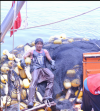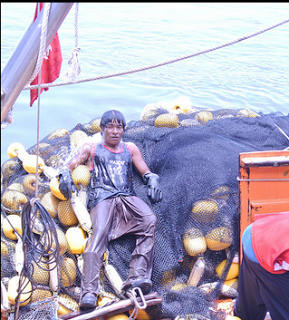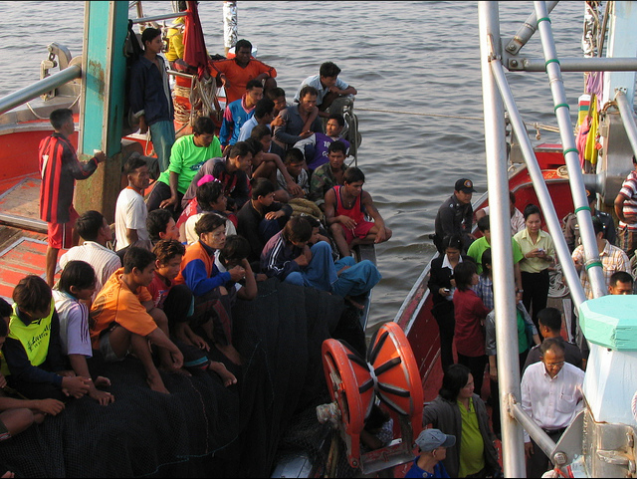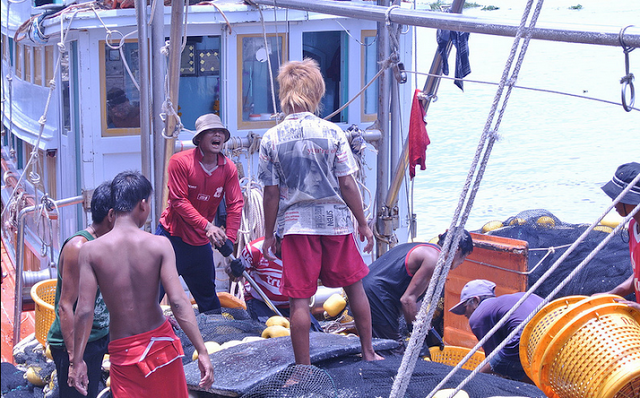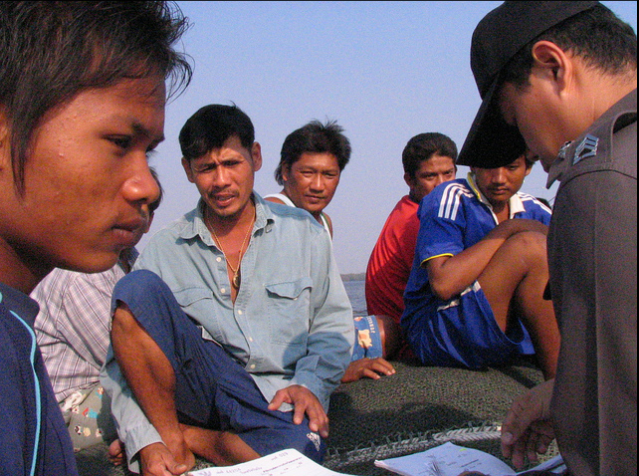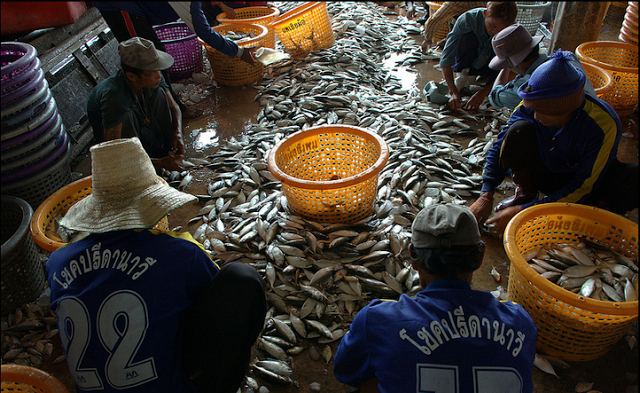BUT INTERNATIONAL LABOUR ORGANISATION IS NOT MY FATHER?
That Thailand’s fishing industry has been running out of control for years now seems to be very much public knowledge for years now. The industry has also been severely criticised internationally for environmental malpractive, such as bottom dredging.
Whether these criticisms will result in any changes remains to be seen. Its all about money and 21st century slave labour.
The International Labour Organisation and the Asia Research Centre has now come out with the largest survey on working conditions in the industry. Its damning of course. But unlike some more courageous NGOs it does not go to specifically naming the culprits. but does not indicate many changes for the better either.
You can read a summary below:
BANGKOK (ILO News) – A new report has found shortfalls in Thailand’s fishing industry in relation to national and international labour standards. The report, co-authored by the International Labour Organization (ILO) and the Asian Research Centre on Migration at Chulalongkorn University, is based on 596 interviews, making it the largest survey to date of working conditions in the Thai fishing sector.
While most of the fishers surveyed entered the fishing sector voluntarily, 32 respondents (5.4 per cent) stated that they were deceived or coerced into work in fishing. The problem was especially pronounced among long-haul fishers, with nearly one in six of the long-haul fishers surveyed (16 per cent) stating that they did not willingly decide to work on a fishing vessel. Of these 32 respondents, 17 workers stated that they were “deceived or forced to work by the agents from the country of origin”, nine workers said it was agents from Thailand and six their family or relatives.
The study found that approximately 17 per cent of those surveyed said they were working against their will and unable to leave because of the threat of penalties. These workers fell into two groups; those who could not leave because of a financial penalty (12 per cent), and those who cited other reasons including the threat of violence or denunciation to the authorities (4.9 per cent). Conditions were found to be worse for those who had been at sea for more than one month; nearly 25 per cent were subjected to deceptive or coercive labour practices.
The survey also found 33 children under the age of 18 working on fishing vessels, of whom seven were under 15. Under the Thai Ministerial Regulation No. 10 and the ILO Convention on Work in Fishing, 2007 (No. 188) those aged 15 and above can work on board ships in certain circumstances, including if the work is not considered hazardous. However, the report notes that this represents “a grey area with regard to child labour, because some work in fishing can be considered hazardous for children, and this can include night work”.
The report concludes that many of the problems faced by fishers are compounded by a lack of employment contracts; 94 per cent of those surveyed did not have a written contract. As such, working hours and the terms of payment, including the method for calculating pay (usually incorporating a share of the sale of the catch), frequency of pay and deductions, are not clearly defined. Other contributing factors include the irregular status of migrant fishers, limited monitoring by the labour inspectorate or other bodies, and the lack of any representative workers’ group.
These research findings will inform the ILO’s work with the Royal Thai Government, employers and workers to strengthen protection for fishers. For example, Thailand’s Ministerial Regulation No. 10 on Sea Fisheries Work is being revised and coordination centres are being established that will allow fishers to be registered and trained, to ensure greater protection in recruitment and employment. Other initiatives underway include measures to improve labour inspection and occupational safety and health, development of a code of conduct and a good labour practices training programme for vessel owners and captains.
“This improved understanding of the situation will help to formulate evidence-based policy responses for regulating the recruitment and employment of fishers and preventing and eliminating all unacceptable forms of work,” said Dr. Supang Chantavanich, Director of the Asian Research Center on Migration. “Improving working conditions is also vital to addressing the severe labour shortages in the fishing sector, and to ensure the sustainability of the industry”.
Thailand is a major supplier in the global trade in fish products, with fish exports exceeding US$7 billion per annum in recent years. The National Fisheries Association of Thailand (NFAT) has estimated that a total of 142,845 fishers are employed by their members, but the fisheries-related enterprises and supporting industries employ many more. Concerns about abuse and exploitation of fishers, particularly migrant fishers, have led to calls from human rights groups, the international community and retailers for the Government and industry to strengthen regulation and protection. However, the true scale of the problem was unknown and additional empirical data was needed.
The fishers surveyed were predominantly irregular migrants from Myanmar and Cambodia; eight per cent were from Thailand. Just over 80 per cent of those surveyed were working on short-haul voyages of less than a month. The research was carried out at piers and in the community between May and September 2012, in four coastal provinces; Ranong, Rayong, Samut Sakhon and Songkhla.
The survey was organized by the ILO’s Tripartite Action to Protect the Rights of Migrant Workers in the Greater Mekong Subregion (the GMS TRIANGLE project) and the Asian Research Center for Migration at Chulalongkorn University’s Institute of Asian Studies. The study was prepared in consultation with the Thai Ministry of Labour and other relevant government departments, NFAT and civil society organizations.
